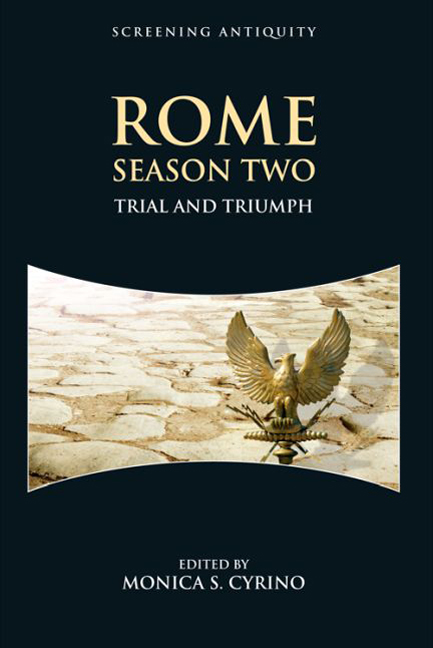Book contents
- Frontmatter
- Contents
- Series Editors’ Preface
- Editor's Acknowledgments
- Contributors
- List of Illustrations
- Episode Listing
- Cast List
- Introduction: The Trials and Triumphs of Rome, Season Two
- PART I POWER AND POLITICS
- PART II Sex and Status
- 8 Revenge and Rivalry in Rome
- 9 Effigies of Atia and Servilia: Effacing the Female Body in Rome
- 10 Livia, Sadomasochism, and the Anti-Augustan Tradition in Rome
- 11 Windows and Mirrors: Illuminating the Invisible Women of Rome
- 12 Antony and Atia: Tragic Romance in Rome
- 13 Problematic Masculinity: Antony and the Political Sphere in Rome
- 14 Rome, Shakespeare, and the Dynamics of the Cleopatra Reception
- 15 The Rattle of the Sistrum: “Othering” Cleopatra and Egypt in Rome
- 16 Gateways to Vice: Drugs and Sex in Rome
- 17 Slashing Rome: Season Two Rewritten in Online Fanfiction
- Filmography
- Bibliography
- Index
8 - Revenge and Rivalry in Rome
from PART II - Sex and Status
Published online by Cambridge University Press: 07 October 2017
- Frontmatter
- Contents
- Series Editors’ Preface
- Editor's Acknowledgments
- Contributors
- List of Illustrations
- Episode Listing
- Cast List
- Introduction: The Trials and Triumphs of Rome, Season Two
- PART I POWER AND POLITICS
- PART II Sex and Status
- 8 Revenge and Rivalry in Rome
- 9 Effigies of Atia and Servilia: Effacing the Female Body in Rome
- 10 Livia, Sadomasochism, and the Anti-Augustan Tradition in Rome
- 11 Windows and Mirrors: Illuminating the Invisible Women of Rome
- 12 Antony and Atia: Tragic Romance in Rome
- 13 Problematic Masculinity: Antony and the Political Sphere in Rome
- 14 Rome, Shakespeare, and the Dynamics of the Cleopatra Reception
- 15 The Rattle of the Sistrum: “Othering” Cleopatra and Egypt in Rome
- 16 Gateways to Vice: Drugs and Sex in Rome
- 17 Slashing Rome: Season Two Rewritten in Online Fanfiction
- Filmography
- Bibliography
- Index
Summary
INTRODUCTION: REEL REVENGE
“I will have my vengeance, in this life or the next.” This line is perhaps one of the most memorable in the film Gladiator (2000), as it comes at a pivotal moment and focuses on the main character's principal motivation: revenge. In this crucial scene, Maximus Decimus Meridius (Russell Crowe), by this point a celebrated gladiator, stands opposite the Emperor Commodus (Joaquin Phoenix) in the arena and removes his helmet to reveal his face, as music swells in the background. Commodus gasps at the shocking sight of him alive, and Maximus announces that he is “father to a murdered son, husband to a murdered wife” and he will have his revenge. While this line is now legendary among fans, the general theme of vengeance has long been a mainstay of the sword and sandal genre, often providing the driving motivation for the male hero, as well as overall narrative stimulation.
Hence it is not surprising that revenge is also a major force in the action of the second season of Rome, picking up on and augmenting a minor theme from the first season. While the instances of revenge in the series are clearly inspired by antiquity, the purpose of this chapter is not to trace their historical roots, but to consider them within a larger modern cultural and cinematic framework, in particular examining how the series has moved revenge out of the domain of men into that of women.
The involvement of women in intrigues is not a novel take on ancient Rome. One need only think about the scheming women of I, Claudius (1976), such as Livia (Siân Phillips) and Messalina (Sheila White), to see a pattern. But the sword and sandal genre typically has not depicted female revenge as the main focus of these schemes. Even a major theme of its second season. The cover art for the DVD box of the second season sets up the theme of female revenge, even before the viewer watches an episode. On the cover there is a woman in profile view with long hair, wearing a flowing white dress and gripping a dagger at her side: the dagger faces outwards toward the viewer. Blood covers the ground near her feet, while blood drips from the “e” in the series title.
- Type
- Chapter
- Information
- Rome Season TwoTrial and Triumph, pp. 105 - 116Publisher: Edinburgh University PressPrint publication year: 2015

